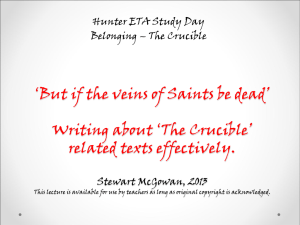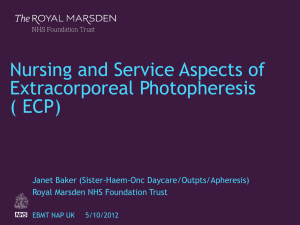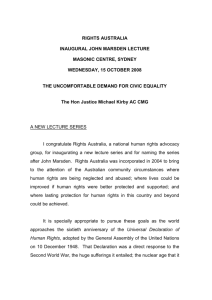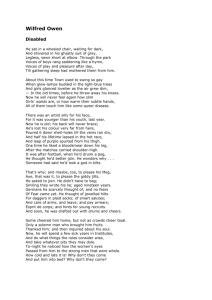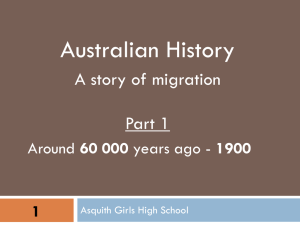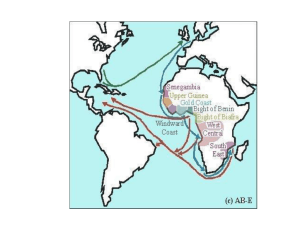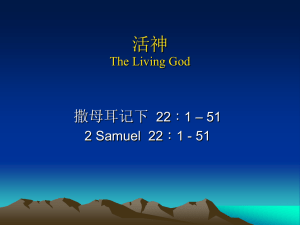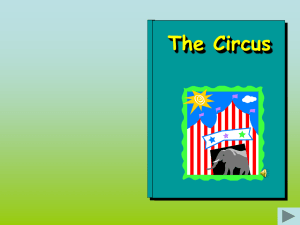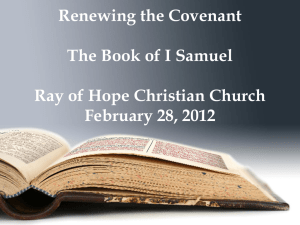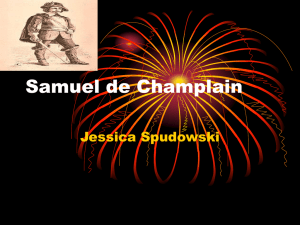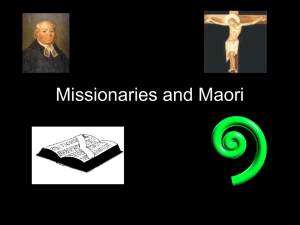The Vesper-Song of the Reverend Samuel Marsden
advertisement
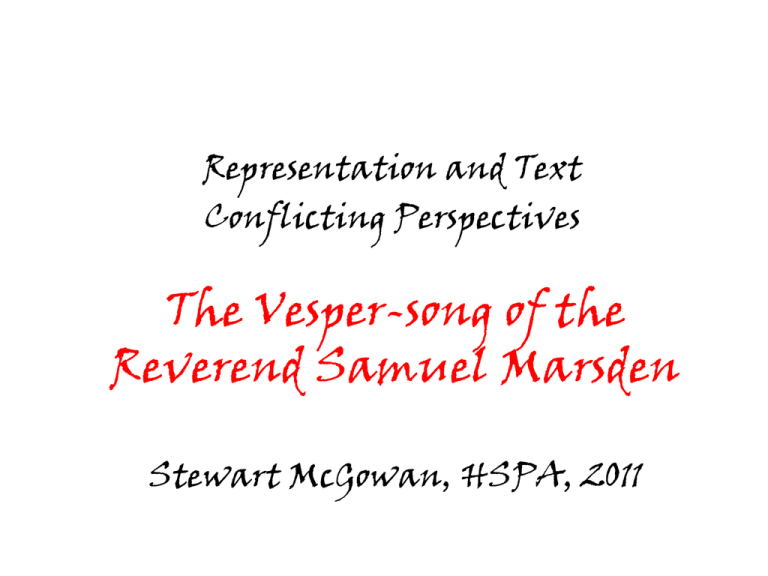
Representation and Text Conflicting Perspectives The Vesper-song of the Reverend Samuel Marsden Stewart McGowan, HSPA, 2011 Lecture Overview • Encourage personal response to related texts, particularly Slessor’s poem • Use the rubric sheet to guide analysis of texts • Focus on language features of Slessor’s representation of Marsden • Provide insight into relating chosen texts to Conflicting Perspectives and The Justice Game MODULE C: Representation and Text This module requires students to explore various representations of events, personalities or situations. They evaluate how medium of production, textual form, perspective and choice of language influence meaning. The study develops students’ understanding of the relationships between representation and meaning. (Reread English Stage 6 Syllabus, p 52.) ELECTIVES: Advanced MODULE C: Representation and Text Elective 1: Conflicting Perspectives In their responding and composing, students consider the ways in which conflicting perspectives on events, personalities or situations are represented in their prescribed text and other related texts of their own choosing. Students analyse and evaluate how acts of representation, such as the choice of textual forms, features and language, shape meaning and influence responses. Students choose one of the following texts as the basis of their further exploration of the representations of conflicting perspectives. Background: Marsden • http://www.adb.online. anu.edu.au/biogs/A02 0176b.htm • Wikipedia article includes a description of Marsden overseeing the flogging of convicts MARSDEN, SAMUEL (1765-1838), chaplain, missionary and farmer, was born on 24 June 1765 at Farsley, Yorkshire, England, the son of Thomas Marsden, a blacksmith… … The advent of the more religiously inclined Governor John Hunter in 1795 recognized the chaplain's efforts to reclaim the convicts' souls or at least to achieve an outward observance of moral and religious injunctions; but this effect was counterbalanced by Marsden's appointment as a magistrate and superintendent of government affairs at Parramatta. Clerical justices were common in England at the time but his magisterial posts kept him occupied with heavy temporal duties, and they also further estranged him as a clergyman from the convicts to whom he dispensed justice. No aspects of Marsden's activities did more harm to his pastoral work or to his historical character in Australia than his reputation for extreme severity as a magistrate. This was firmly set by September 1800 when, in the course of an inquiry into a suspected Irish uprising, Judge Advocate Richard Atkins and Marsden had a suspect flogged mercilessly in the hope of securing information about hidden weapons. This particular action was scarcely defensible, but Marsden was not the only magistrate who ordered the infliction of illegal punishments. His general severity can be attributed to his high-mindedness, his passionate detestation of sin and his conviction that Parramatta was such a sink of iniquity that morality could be preserved only by the most rigorous disciplinary measures. For all that, the flogging parson, like the hanging judge, is commonly regarded as an unattractive character. MARSDEN, SAMUEL (1765-1838), chaplain, missionary and farmer, was born on 24 June 1765 at Farsley, Yorkshire, England, the son of Thomas Marsden, a blacksmith… … The advent of the more religiously inclined Governor John Hunter in 1795 recognized the chaplain's efforts to reclaim the convicts' souls or at least to achieve an outward observance of moral and religious injunctions; but this effect was counterbalanced by Marsden's appointment as a magistrate and superintendent of government affairs at Parramatta. Clerical justices were common in England at the time but his magisterial posts kept him occupied with heavy temporal duties, and they also further estranged him as a clergyman from the convicts to whom he dispensed justice. No aspects of Marsden's activities did more harm to his pastoral work or to his historical character in Australia than his reputation for extreme severity as a magistrate. This was firmly set by September 1800 when, in the course of an inquiry into a suspected Irish uprising, Judge Advocate Richard Atkins and Marsden had a suspect flogged mercilessly in the hope of securing information about hidden weapons. This particular action was scarcely defensible, but Marsden was not the only magistrate who ordered the infliction of illegal punishments. His general severity can be attributed to his high-mindedness, his passionate detestation of sin and his conviction that Parramatta was such a sink of iniquity that morality could be preserved only by the most rigorous disciplinary measures. For all that, the flogging parson, like the hanging judge, is commonly regarded as an unattractive character. Rubric Examples and significance Representation of events, personalities and situations About a personality and his influence: Rev Samuel Marsden Conflicting perspectives Notes that the man is controversial: is he a ‘hard man for hard times’ or a sadist? Evaluate medium of production, textual form, perspective and language choice Biographical article – online. Concerned with objectivity while still drawing conclusions about the character and significance of the man Academic language. attempts to summarise the historical assessment of Marsden. Concentrates on factual details initially, then on a balanced assessment of his character e.g. ‘Marsden was not the only magistrate who ordered the infliction of illegal punishments’: focus is on the historical perspective rather than the character of the man How do choices shape meaning and influence response? article is learned, largely dispassionate and factual. Background: Marsden . The very first blows made the blood spout out from Fitzgerald's shoulders; and I felt so disgusted and horrified, that I turned my face away from the cruel sight. ... I have witnessed many horrible scenes; but this was the most appalling sight I had ever seen. The day was windy, and I protest. that although I was at least fifteen yards to leeward, from the sufferers, the blood, skin, and flesh blew in my face as the executioners shook it off from their cats. Fitzgerald received his whole three hundred lashes, Rubric Examples and significance Representation of events, personalities and situations Focus is on an event: an eye-witness account of a flogging Conflicting perspectives initial conflict is between convicts and the law. However, the narrator ‘s view can be inferred Evaluate medium of production, textual form, perspective and language choice eye-witness account: primary source some unfamiliar language: leeward, cats description dwells on the details of the punishment: “although I was at least fifteen yards to leeward, from the sufferers, the blood, skin, and flesh blew in my face as the executioners shook it off from their cats” personal view clearly indicated: “appalling” How do choices shape meaning and influence response? narrator shows and tells us of his disagreement with the situation; he positions us close to the event in an effort to get us to share the horror that he feels. The Vesper-song of the Reverend Samuel Marsden Kenneth Slessor The Vesper-song of the Reverend Samuel Marsden First Responses VESPER-SONG OF THE REVEREND SAMUEL MARSDEN My cure of souls, my cage of brutes, Go lick and learn at these my boots! When tainted highways tear a hole, I bid my cobbler welt the sole. 0, ye that wear the boots of Hell, Shall I not welt a soul as well? 0, souls that leak with holes of sin, Shall I not let God's leather in, or hit with sacramental knout Your twice-convicted vileness out? Lord, I have sung with ceaseless lips A tinker's litany of whips, Have graved another Testament On backs bowed down and bodies bent. My stripes of jewelled blood repeat A scarlet Grace for holy meat. Not mine, the Hand that writes the weal On this, my vellum of puffed veal, Not mine, the glory that endures, But Yours, dear God, entirely Yours. Are there not Saints in holier skies Who have been scourged to Paradise? 0, Lord, when I have come to that, Grant there may be a Heavenly Cat With twice as many tails as hereAnd make me, God, Your Overseer. But if the veins of Saints be dead, Grant me a whip in Hell instead, Where blood is not so hard to fetch. But I, Lord, am Your humble wretch. - Kenneth Slessor Rubric Examples and significance Representation of events, personalities and situations Focus is on an personality Slessor imagines Marsden addressing his ‘congregation’: Conflicting perspectives Conflict is initially between Marsden and the convicts Evaluate medium of production, textual form, perspective and language choice poem, first person, language is of exceptionally high modality: ‘come lick and learn at these my boots’ written in the 1930’s, near the centenary of Marsden’s death. Written against the background of the Depression and inevitable war Marsden’s humility is ironic: ‘humble wretch’ – no! much of the language is unfamiliar: Language –vocabulary Cure – pun: curates in the church have charge over a cure sole: another pun human soul/ sole of a shoe God’s leather i.e. A whip Sacrament: a holy service knout: another sort of whip twice-convicted: i.e. A convict who has again broken the law tinker’s litany: tinkers wares would clatter and rattle as they approached: a litany is a religious chant or song graved: another pun: engraved/ sent to his grave testament: Old and New... But note what the Bible says about anyone who writes ‘another testament Language –vocabulary stripes of jewelled blood: the marks of the whip – but note the metaphor! Like jewels! (Milton + false paradise?) Grace: ‘state of Grace’ a state of spiritual contentment weal: wound left by a whip vellum: soft, thin leather, originally used for books (note the extended metaphor glory is ironic: Gloria in excelsis deo Glory to God! Marsden hypocritically claims that he does all this for god scourged: cleansed of sin by whipping. Suggests sadomasochism cat: cat-o’ nine tails – a whip (but the multiple tails...) overseer: responsible for supervising (and punishing) convicts ‘grant me a whip in Hell instead’: if you don’t need someone to swing a whip in heaven.... VESPER-SONG OF THE REVEREND SAMUEL MARSDEN My cure of souls, my cage of brutes, Go lick and learn at these my boots! When tainted highways tear a hole, I bid my cobbler welt the sole. 0, ye that wear the boots of Hell, Shall I not welt a soul as well? 0, souls that leak with holes of sin, Shall I not let God's leather in, or hit with sacramental knout Your twice-convicted vileness out? Lord, I have sung with ceaseless lips A tinker's litany of whips, Have graved another Testament On backs bowed down and bodies bent. My stripes of jewelled blood repeat A scarlet Grace for holy meat. Not mine, the Hand that writes the weal On this, my vellum of puffed veal, Not mine, the glory that endures, But Yours, dear God, entirely Yours. Are there not Saints in holier skies Who have been scourged to Paradise? 0, Lord, when I have come to that, Grant there may be a Heavenly Cat With twice as many tails as hereAnd make me, God, Your Overseer. But if the veins of Saints be dead, Grant me a whip in Hell instead, Where blood is not so hard to fetch. But I, Lord, am Your humble wretch. VESPER-SONG OF THE REVEREND SAMUEL MARSDEN My cure of souls, my cage of brutes, Go lick and learn at these my boots! When tainted highways tear a hole, I bid my cobbler welt the sole. 0, ye that wear the boots of Hell, Shall I not welt a soul as well? 0, souls that leak with holes of sin, Shall I not let God's leather in, or hit with sacramental knout Your twice-convicted vileness out? Lord, I have sung with ceaseless lips A tinker's litany of whips, Have graved another Testament On backs bowed down and bodies bent. My stripes of jewelled blood repeat A scarlet Grace for holy meat. Not mine, the Hand that writes the weal On this, my vellum of puffed veal, Not mine, the glory that endures, But Yours, dear God, entirely Yours. Are there not Saints in holier skies Who have been scourged to Paradise? 0, Lord, when I have come to that, Grant there may be a Heavenly Cat With twice as many tails as hereAnd make me, God, Your Overseer. But if the veins of Saints be dead, Grant me a whip in Hell instead, Where blood is not so hard to fetch. But I, Lord, am Your humble wretch. Rubric How do choices shape meaning and influence response? Draft paragraph: This is the incomplete draft of my paragraph. More needs to be done. Specifically, it still needs to be linked to The Justice Game. Try this for yourselves: finish this paragraph and then write another that explores the links between this poem and one of the chapters in TJG. A final note: do you agree that this is a more effective related text than the two historical sources? What does this tell you about choosing related texts? Examples and significance Slessor uses the medium of poetry to launch a vicious satirical critique of Samuel Marsden and the values and attitudes he represents. He has his persona speak of how his ‘...stripes of jewelled blood repeat/ A scarlet Grace for holy meat.’ It is a startling image that combines the religious idea of ‘Grace’ and the comparison of pieces of ‘meat’ flying from the backs of whipped convicts as ‘jewels.’ Slessor challenges the historical view of Marsden as a tough man for tough times, showing us instead a hypocritical sadist. In terms of conflicting perspectives. Slessor’s perspective on Marsden is an effective critique of those who would use violence to… VESPER-SONG OF THE REVEREND SAMUEL MARSDEN My cure of souls, my cage of brutes, Go lick and learn at these my boots! When tainted highways tear a hole, I bid my cobbler welt the sole. 0, ye that wear the boots of Hell, Shall I not welt a soul as well? 0, souls that leak with holes of sin, Shall I not let God's leather in, or hit with sacramental knout Your twice-convicted vileness out? Lord, I have sung with ceaseless lips A tinker's litany of whips, Have graved another Testament On backs bowed down and bodies bent. My stripes of jewelled blood repeat A scarlet Grace for holy meat. Not mine, the Hand that writes the weal On this, my vellum of puffed veal, Not mine, the glory that endures, But Yours, dear God, entirely Yours. Are there not Saints in holier skies Who have been scourged to Paradise? 0, Lord, when I have come to that, Grant there may be a Heavenly Cat With twice as many tails as hereAnd make me, God, Your Overseer. But if the veins of Saints be dead, Grant me a whip in Hell instead, Where blood is not so hard to fetch. But I, Lord, am Your humble wretch.
